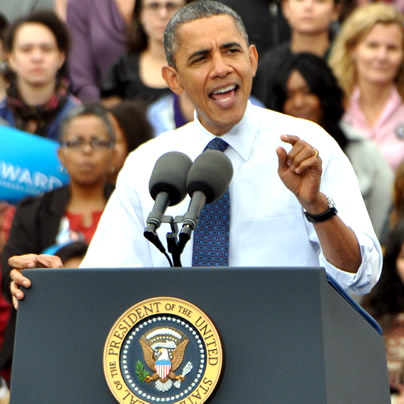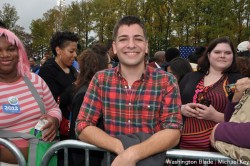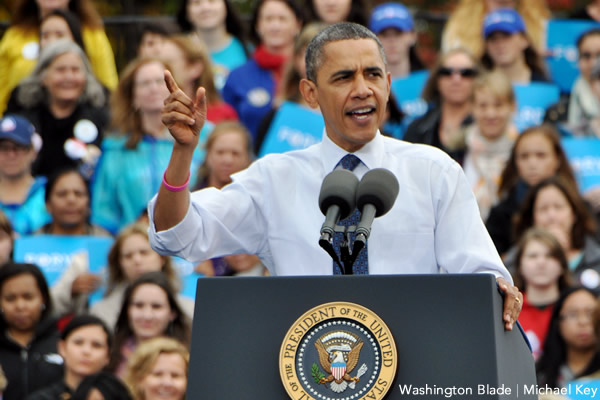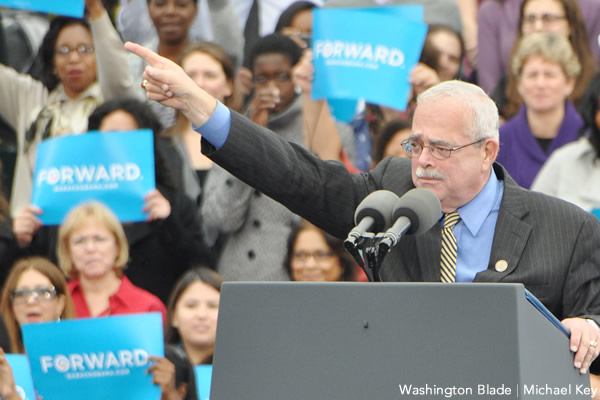Local
Obama campaigns in Va. on LGBT-inclusive vision
President coins ‘Romnesia’ to describe GOP nominee’s shift in positions

FAIRFAX, Va. — President Obama presented an LGBT-inclusive vision for the country Friday during a campaign rally in a battleground state that could help determine the outcome of the election.
In an event at George Mason University that focused mostly on his commitment to women’s issues, Obama ticked off a list of accomplishments over his first term that included repeal of “Don’t Ask, Don’t Tell.”
“We repealed ‘Don’t Ask, Don’t Tell,’ to make sure that nobody who wants to serve our country gets kicked out because of who they love,” Obama said, generating applause from the audience.
Obama made additional references to the gay community in the speech. The president twice mentioned “gays” in the concluding portion of his speech warning his audience that Republican presidential nominee Mitt Romney would reverse gains already made.
“In 18 days, you can let them turn back the clock 50 years for immigrants, and gays, and women, or we can stand up and say we are a country in which everybody has a place,” Obama said. “A country where no matter where you are, no matter what you look like, no matter where you come from — black, white, Hispanic, Asian, Native American, young, old, gay, straight, abled, disabled — we have a place for everybody.”
The inclusion of gays in Obama’s remarks at the rally stand in contrast to a campaign season that has been virtually devoid of discussion of same-sex marriage and other LGBT issues. The speech was more akin to the Democratic National Convention, where speakers emphasized LGBT-inclusiveness to pump up the crowd.
Among the estimated 9,000 people in attendance at the rally were members of the LGBT community who said they were delighted Obama made explicit references to them.
Broderick Greer, 22, a gay graduate student at the Virginia Theological Seminary, said Obama’s reference to “Don’t Ask, Don’t Tell” repeal was exciting.
“Sometimes I forgot about the strides that we’ve made with LGBT rights in the last few years since he’s been president,” Greer said. “When I heard repealing ‘Don’t Ask, Don’t Tell,’ I screamed so loud that I hurt the lady’s ears in front of me. I think she was kind of upset.”
Greer said he’s already volunteered to work on behalf of the Obama campaign on the Saturday before Election Day knocking on doors in Alexandria, Va., to talk to potential supporters about the president.

Daniel Torin Roberts was among the estimated 9,000 attendees at the Obama rally (Washington Blade photo by Michael Key)
Daniel Torin Roberts, 22, a gay recent graduate of George Mason University, also said he thought Obama’s inclusion of gays in his rally speech was important.
“You want to feel like you have a seat at the table, like he’s still thinking about you and everything he’s doing and it’s still a concern,” Roberts said. “He carries what we want with him, he knows what we want and he’s still fighting for us.”
But the most memorable part of the speech was Obama coining a new term to describe Romney’s pivot away from the conservative policies he articulated during the Republican primary: “Romnesia.”
“Now that we’re 18 days out from the election, Mr. ‘Severely Conservative’ wants you to think he was severely kidding about everything he said over the last year,” Obama said. “I mean, he’s changing up so much and backtracking and sidestepping we’ve got to name this condition that he’s going through. I think it’s called ‘Romnesia.'”
Among the policy shifts that Obama has identified is Romney saying he’s for equal pay for women, but reluctant to say whether he would have supported the Lilly Ledbetter Fair Pay Act, in addition to his shift during the first presidential debate when he said he doesn’t support tax cuts for the wealthy if they add to the deficit.
Obama concluded his riff about “Romnesia” by saying people shouldn’t worry if they find themselves coming down with similar symptoms because there’s good news: “Obamacare covers preexisting conditions.”
The 13 electoral votes in Virginia could be crucial in determining the outcome of the presidential election. As national polls continue to show a tight race, an American Research Group poll published on Oct. 16 found Romney and Obama virtually tied in the state, with Romney leading 48-47.
Prior to Obama’s speech, a number of prominent Obama supporters appeared on stage to hype Obama’s work on women’s issues and to criticize Romney for holding positions they believed were contrary to supporting women, such as his pledge to defund Planned Parenthood and restrict abortion rights. Among the speakers were Terri Riley, an Obama campaign leader in Virginia; Nan Johnson, a local retired school counselor; and Cecile Richards, president of Planned Parenthood Action Fund.
Johnson had particularly harsh words for Romney’s widely lampooned comments during the debate earlier this week that he selected female appointees to serve in his administration after requesting “binders full of women” who had submitted resumes to women’s groups.
“He admitted that when he became governor of Massachusetts, he had no idea where to find a single qualified woman,” Johnson said. “He needed someone to give him resumes stuffed in some binders instead. If he was saying that as governor, I wonder what he did during his 25 years in the corporate world.”
Johnson continued to say that she was even more troubled by Romney’s remarks that if you want women in the workforce, some flexibility is necessary because those remarks sounded as if “a woman with a job is some kind of proposition that you debate in a board room.”
Rep. Gerry Connolly (D-Va.) also appeared on stage and drew on the binder remarks, holding a binder before him and saying, “I’m from Massachusetts originally, and I found the binder full of women.” Then, shaking his head, Connolly said, “Not so much,” and said Romney had one of the worst records in modern history in appointing women to the courts.
“When people asked me why am I supporting President Obama, I have a pretty simple answer,” Connolly said. “Because I have a daughter.”

In an official statement released at the reveal event Capital Pride Alliance described its just announced 2026 Pride theme of “Exist, Resist, Have the Audacity” as a “bold declaration affirming the presence, resilience, and courage of LGBTQ+ people around the world.”
The statement adds, “Grounded in the undeniable truth that our existence is not up for debate, this year’s theme calls on the community to live loudly and proudly, stand firm against injustice and erasure, and embody the collective strength that has always defined the LGBTQ+ community.”
In a reference to the impact of the hostile political climate, the statement says, “In a time when LGBTQ+ rights and history continue to face challenges, especially in our Nation’s Capital, where policy and public discourse shape the future of our country, together, we must ensure that our voices are visible, heard, and unapologetically centered.”
The statement also quotes Capital Pride Alliance CEO and President Ryan Bos’s message at the Reveal event: “This year’s theme is both a declaration and a demand,” Bos said. “Exist, Resist, Have Audacity! reflects the resilience of our community and our responsibility to protect the progress we’ve made. As we look toward our nation’s 250th anniversary, we affirm that LGBTQ+ people have always been and always will be part of the United States’s history, and we will continue shaping its future with strength and resolve,” he concluded.
District of Columbia
Capital Pride board member resigns, alleges failure to address ‘sexual misconduct’
In startling letter, Taylor Chandler says board’s inaction protected ‘sexual predator’

Taylor Lianne Chandler, a member of the Capital Pride Alliance Board of Directors since 2019 who most recently served as the board’s secretary, submitted a letter of resignation on Feb. 24 that alleges the board has failed to address instances of “sexual misconduct” within the Capital Pride organization.
The Washington Blade received a copy of Chandler’s resignation letter one day after she submitted it from an anonymous source. Chandler, who identifies as transgender and intersex, said in an interview that she did not send the letter to the Blade, but she suspected someone associated with Capital Pride, which organizes D.C.’s annual LGBTQ Pride events, “wants it out in the open.”
“It is with a heavy heart, but with absolute clarity, that I submit my resignation from the Capital Pride Alliance Board of Directors effective immediately,” Chandler states in her letter. “I have devoted nearly ten years of my life to this organization,” she wrote, pointing to her initial involvement as a volunteer and later as a producer of events as chair of the organization’s Transgender, Gender Non-Conforming, and Intersex Committee.
“Capital Pride once meant something profound to me – a space of safety, visibility, and community for people who have often been denied all three,” her letter continues. “That is no longer the organization I am part of today.”
“I, along with other board members, brought forward credible concerns regarding sexual misconduct – a pattern of behavior spanning years – to the attention of this board,” Chandler states in the letter. “What followed was not accountability. What followed was retaliation. Rather than addressing the substance of what was reported, officers and fellow board members chose to chastise those of us who came forward.”
The letter adds, “This board has made its priorities clear through its actions: protecting a sexual predator matters more than protecting the people who had the courage to come forward. … I have been targeted, bullied, and made to feel like an outsider for doing what any person of integrity would do – telling the truth.”
In response to a request from the Blade for comment, Anna Jinkerson, who serves as chair of the Capital Pride board, sent the Blade a statement praising Taylor Chandler’s efforts as a Capital Pride volunteer and board member but did not specifically address the issue of alleged sexual misconduct.
“We’re also aware that her resignation letter has been shared with the media and has listed concerns,” Jinkerson said in her statement. “When concerns are brought to CPA, we act quickly and appropriately to address them,” she said.
“As we continue to grow our organization, we’re proactively strengthening the policies and procedures that shape our systems, our infrastructure, and the support we provide to our team and partners,” Jinkerson said in her statement. “We’re doing this because the community’s experience with CPA must always be safe, affirming, empowering, and inclusive,” she added.
In an interview with the Blade, Chandler said she was not the target of the alleged sexual harassment.
She said a Capital Pride investigation identified one individual implicated in a “pattern” of sexual harassment related behavior over a period of time. But she said she was bound by a Non-Disclosure Agreement (NDA) that applies to all board members and she cannot disclose the name of the person implicated in alleged sexual misconduct or those who came forward to complain about it.
“It was one individual, but there was a pattern and a history,” Chandler said, noting that was the extent of what she can disclose.
“And I’ll say this,” she added. “In my opinion, with gay culture sometimes the touchy feely-ness that goes on seems to be like just part of the culture, not necessarily the same as a sexual assault or whatever. But at the same time, if someone does not want those advances and they’re saying no and trying to push you away and trying to avoid you, then it makes it that way regardless of the culture.”
When asked about when the allegations of sexual harassment first surfaced, Chandler said, “In the past year is when the allegation came forward from one individual. But in the course of this all happening, other individuals came forward and talked about instances – several which showed a pattern.”
Chandler’s resignation comes about five months after Capital Pride Alliance announced in a statement released in October 2025 that its then board president, Ashley Smith, resigned from his position on Oct. 18 after Capital Pride became aware of a “claim” regarding Smith. The statement said the group retained an independent firm to investigate the matter, but it released no further details since that time. Smith has declined to comment on the matter.
When asked by the Blade if the Smith resignation could be linked in some way to allegations of sexual misconduct, Chandler said, “I can’t make a comment one way or the other on that.”
Chandler’s resignation and allegations come after Capital Pride Alliance has been credited with playing the lead role in organizing the World Pride celebration hosted by D.C. in which dozens of LGBTQ-related Pride events were held from May through June of 2025.
The letter of resignation also came just days before Capital Pride Alliance’s annual “Reveal” event scheduled for Feb. 26 at the Hamilton Hotel in which the theme for D.C.’s June 2026 LGBTQ Pride events was to be announced along with other Pride plans.
District of Columbia
Capital Stonewall Democrats elect new leaders
LGBTQ political group set to celebrate 50th anniversary

Longtime Democratic Party activists Stevie McCarty and Brad Howard won election last week as president and vice president for administration for the Capital Stonewall Democrats, D.C.’s largest local LGBTQ political organization.
In a Feb. 24 announcement, the group said McCarty and Howard, both of whom are elected DC Advisory Neighborhood Commissioners, ran in a special Capital Stonewall Democrats election to fill the two leadership positions that became vacant when the officers they replaced resigned.
Outgoing President Howard Garrett, who McCarty has replaced, told the Washington Blade he resigned after taking on a new position as chair of the city’s Ward 1 Democratic Committee. The Capital Stonewall Democrats announcement didn’t say who Howard replaced as vice president for administration.
The group’s website shows its other officers include Elizabeth Mitchell as Vice President for Legislative and Political Affairs, and Monica Nemeth as Treasurer. The officer position of secretary is vacant, the website shows.
“As we look toward 2026, the stakes for D.C. and for LGBTQ+ communities have never been clearer,” the group’s statement announcing McCarty and Howard’s election says. “Our 50th anniversary celebration on March 20 and the launch of our D.C. LGBTQ+ Voter’s Guide mark the beginning of a major year for endorsements, organizing, and coalition building,” the statement says.
McCarty said among the organization’s major endeavors will be holding virtual endorsement forums where candidates running for D.C. mayor and the Council will appear and seek the group’s endorsement.
Founded in 1976 as the Gertrude Stein Democratic Club, the organization’s members voted in 2021 to change its name to Capital Stonewall Democrats. McCarty said the 50th anniversary celebration on March 20, in which D.C. Mayor Muriel Bowser and members of the D.C. Council are expected to attend, will be held at the PEPCO Gallery meeting center at 702 8th St., N.W.
-

 Federal Government5 days ago
Federal Government5 days agoTwo very different views of the State of the Union
-

 Virginia5 days ago
Virginia5 days agoVa. activists preparing campaign in support of repealing marriage amendment
-

 Opinions4 days ago
Opinions4 days agoThe global cost of Trump’s foreign aid ideology
-

 Opinions4 days ago
Opinions4 days agoCriteria for supporting a candidate in D.C.



















